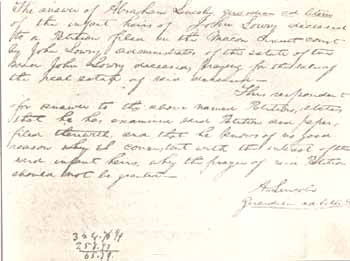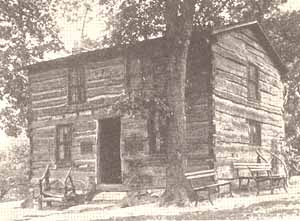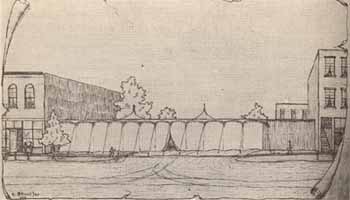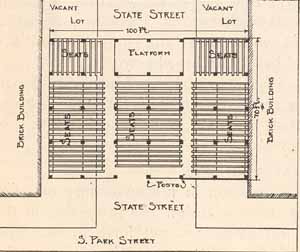|
THOUGH Abraham Lincoln left Macon county in the spring of
1831, and never afterwards made it his home, Decatur has other
claims on him. After Lincoln was admitted to the bar in
1837, he was in Decatur often on law cases, and it was in Decatur
that his name first was submitted as a candidate for the presidency
of the United States. One case in which he appeared - of interest
became it was heard in the old log court house - was the ex-parte
case of John Lowry, administrator, at the May term of court
in 1838. John Hanks was on the jury at that time.
Lincoln's reply in the case, in his own handwriting, is among the
papers now on file at the Macon county court house.

LINOLN DOCUMENT ON FILE AT COURT HOUSE
The answer of Abraham Lincoln, guardian ad
litem in case number A-156 (John Lowry), written and signed
by Lincoln, and filed in the circuit court of Macon county,
June 5, 1838. At the time this case was heard, in May,
1838, Macon county was building its new brick court house.

LOG COURT HOUSE TODAY The new building was
not finished until in June, and was accepted by the county June 20,
so there is no doubt but that the old log court house was still in
sue when the Lowry case came up. This statement is made
because some writers have tried to prove that Lincoln never
had any law practice here in the old log court house, the building
now standing in Fairview park. COURT WEEK While
traveling the eighth judicial circuit, Lincoln was often in
Decatur, it being customary for lawyers to follow the court from
county to county. The Macon house, at the corner of Prairie and
Franklin streets was his stopping place. Because the Macon
house was a better class of hostelry than they found in many of the
towns they visited, the attorneys always enjoyed their stay in
Decatur. In fact, it is said that they prolonged the business
of the court in order to remain here longer. Court week was always
a big week. The town was filled to overflowing with visitors.
Lawyers, their clients and witnesses naturally would be here, but
there was also the usual following of peddlers, show men, gamblers
and mere curiosity seekers. Gay social events were arranged
for that week. There was always something doing when court
week came. It was while traveling the circuit that Lincoln
heard and told so many of the stories which made him so entertaining
and so popular. His kindness, honesty and courtesy to everyone
did as much, however, to win him friends. Among many incidents
about Lincoln told by Mrs. Jane Martin Johns is
the one about his helping with her piano. She was living at
the Macon hotel when her piano came, the first in Decatur. She
asked the landlord whom she could get to help carry it in. He
said: "Court will be out soon and the lawyers will come to dinner.
We can get them to help". Soon they came, one a tall, slim,
muscular man wearing a heavy gray shawl as men wore then. That
was Lincoln. With others he took hold and helped carry in
and set up the piano. "Now," he said, "perhaps this lady will play
for us." She did so. Lincoln was honored by the Illinois
newspaper editors when they met in Decatur, Feb. 22, 1856, and took
the first steps toward the organization of the Republican party in
Illinois. This meeting had been called for the purpose of
organizing the Anti-Nebraska bill forces. It was held at the Cassell
house (on the site of the St. Nicholas), and after the
meeting a banquet was held, at which Lincoln made the
principal speech. CAMPAIGN SPEECHES Though none of the memorable
series of Lincoln-Douglas debates series of debates,
and only a short time before the election. Douglas was
here first and Lincoln a few days afterwards.
Lincoln appeared to be utterly worn out by his hard work during
the campaign, and his voice was so weak that he could hardly be
heard across the hall. Previous to this, probably in the year
1858, Lincoln spoke in Powers hall, and Douglas
spoke at the furniture factory. On one occasion that year the
two men had a debate in Imboden's grove, according to some of
the old time residents. THE GREATEST OVATION
Lincoln received his greatest ovation in Macon county on May 10,
1860, when the state Republican convention was in session in the
Wigwam, on State street, and his name was put forth for the first
time as a candidate for the presidency. His nomination came at
the national convention held a short time afterwards in Chicago.

THE WIGWAM
The Wigwam was a temporary structure, with canvas roof, built
especially for this convention, for Decatur had no building adequate
to accommodate the crowd the convention would bring. It
fronted on South Park street, and was about 100 feet by 70 feet in
size. The stand was at the south side and the roof was so low
that the heads of men as tall as Lincoln nearly touched it.
The seats were made of planks. D. C. Shockley was the
contractor who erected the building. It cold accommodate 900
persons.

INTERIOR OF WIGWAM Republicans from all over
the state assembled on that memorable day to nominate a candidate
for governor, but spent most of their time in talking possible
presidential candidates. Some days before the meeting Richard J.
Oglesby had conceived the idea of using some catchy expression in
his plan to bring the name of Lincoln before the convention.
In an effort to find something suitable, he asked John Hanks one day
what kind of work "Abe used to be good at." "Not much of anything
but dreaming," Hanks replied, "but he did help me once to
split a lot of rails." So Oglesby's idea of the "railsplitter"
candidate was born. Together he and John Hanks went to the
clearing south of Harristown where Lincoln and Hanks had split rails
years before. They brought back with them two walnut rails,
identified by Hanks as some of the rails the two men had made.
Oglesby's next move was to have a banner fastened to these
two rails. On the banner were the words:
"Abraham Lincoln, the Railsplitter candidate for President in 1860.
Two rails from a lot of 3,000 made in 1830 by John Hanks and Abe
Lincoln. Whose father was the first pioneer in Macon count."
(The last was untrue)
After the convention had opened, Oglesby arose and announced that an
old Democrat wanted to make a contribution to the convention.
At once every one was interested. Just then John Hanks and
Isaac Jennings came in carrying the banner. The assembly went
wild.
John M. Palmer jumped to his feet with a resolution declaring that
Lincoln was the first choice of the Republican party in Illinois for
the presidency and instructing the delegates to the Chicago
convention to use all honorable means to secure the nomination, and
to cast the vote of the state as a unit for him.
PANDEMONIUM
The resolution was adopted, and pandemonium reigned. Men
jumped up and down in their excitement. Yells and cheers
filled the air. Hats, canes, books, anything one could lay
hands on, were tossed to the roof. The cheering literally
raised the roof - or rather lowered it - for part of the awning
fell. The Wigwam was almost a wreck.
"Lincoln", "Lincoln," the people shouted. A committee had to
be sent to find him.
He was located in the Peake jewelry store lying on a couch asleep.
He was rushed over to the Wigwam. Then there was another
demonstration. When asked if he split those rails, Lincoln
replied:
"Gentlemen, John and I did split some rails down there. I do
not know if these are the identical rails or not, but I do know I
have made a heap better ones and could do it again." Thus Lincoln
was started again from Macon county "on his way," this tie to a
larger and never-to-be-forgotten career. From henceforth, he
belonged, not to any city or any county or any state, but to the
nation. HIS LAST GOODBYE After his election as
president of the United States Abraham Lincoln came through Decatur
twice. One time was on Jan. 30, 1861, when he was on his way to
Charleston to visit his stepmother before he left for Washington to
assume his duties as the nation's head. As they passed the
vicinity of Harristown, Lincoln remarked to his companions, Judge
David Davis and Judge Edmund Bates, about having made enough rails
in that vicinity to fence about ten acres of ground. "That was
about thirty years ago," he said, "and it is hardly to be expected
that I could identify any of the rails now". On his way to
Washington Lincoln again passed through Decatur. That was in
February, 1861, and it proved to be his last visit to this city.
John Quinlan, in an interview published in The Decatur Review, Aug.
26, 1900, said, in speaking of the last time Lincoln was in Decatur:
"It was about the last of February, 1861, and Lincoln was on his way
to Washington to be inaugurated. The train stopped here a few
minutes. The engine was elaborately decorated. Lincoln
came out and made a short speech from the platform. There were
perhaps 300 or 400 people at the depot. Among them were J. R.
Gorin, James Milikin, and I think Lowber Burrows and John
Ullrich.
"I stood within about 15 feet of Mr. Lincoln and heard distinctly.
He appeared sad and depressed and his speech had a melancholy tone.
He seemed to feel that he was telling his friends goodbye with the
Chances against his ever returning. He spoke of the possible
danger of his long trip to Washington. He spoke of the most
eventful years of his life having had spent in Illinois and went
away with the aspect of a man who was very sorry he had to go.
The next time I saw him was when I attended this funeral.
LINCOLN
MEMORIALS Decatur and Macon county have marked in various ways the
points of interest connected with Lincoln's life here, and have
honored im in other ways. On the West drug store building is a
tablet noting the fact that Lincoln passed that way when he came to
Decatur. A boulder was placed to mark the spot near the Sangamon
river in Harristown township where the Lincoln cabin stood. It
was not on the exact site, however.
 The map shows the
roads by which the Lincoln cabin site and the boulder can be
reached. The boulder which was placed by Stephen Decatur
chapter, D. A. R., is about a quarter of a mile from the spot now
accepted as the site. There is no road connecting those two
spots. Figures on the map show the following: 1 - Private road
to site of boulder.
2 - Farm house on Dipper land. The boulder is four feet north
of this house.
3 - Farm house on Whitley land reached by private road from main
road.
4 - Old Whitley dam. Remains of dam still to be seen when
water is low.
5 - Abandoned road (once a public road).
6 - Site of old ford across river, washed out years ago.
7 - Bridge over Sangamon. This is the only bridge across the
river in that neighborhood. The roads marked with small squares
are gravel roads. A temporary marker now stands on the Lincoln
cabin site. It is a piece of tin fastened to a post. On
the tin is inscribed "Lincoln cabin site, 1830". A marker stands
on the Art Institute grounds on West Main street to show the way
Lincoln traveled on the eighth judicial circuit. On the old court
house, now standing in Fairview park, is a tablet telling that
Lincoln practiced law there. On the rear of the Millikin bank
building is a tablet marking the location of the Wigwam, where
Lincoln was suggested as a candidate for president. Lincoln
square, Lincoln theater, Lincoln Avenue, Lincoln park, Lincoln
School, are all named for him. In the public library is the
Jane Hamand collection of Lincolnania which includes the Kirkham
grammer from which Abraham Lincoln studied with Ann Rutledge.
<PREVIOUS> <NEXT>
<CLICK
HERE TO RETURN TO TABLE OF CONTENTS>
|